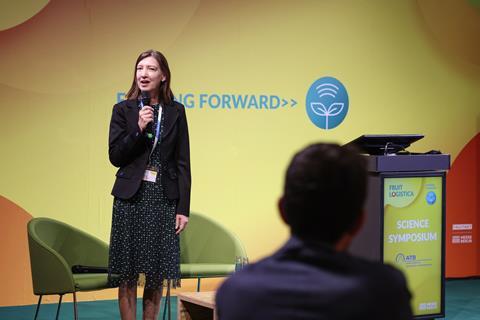With the overarching theme of ’Science for Sustainable Fruit Production’, sessions will highlight new research in robotics, imaging and postharvest technologies that are driving smarter horticulture

The future of fruit and vegetable production and postharvest management will take centre stage at Fruit Logistica 2026 with the Frutic Science Symposium, held on 6 February 2026 from 10.00-14:30 on the Farming Forward Stage.
Organised in cooperation with the Leibniz Institute for Agricultural Engineering and Bioeconomy (ATB), this year’s symposium will explore how robotics, imaging technologies, sensor networks and data-driven decision tools are transforming supply of horticultural products worldwide.
Under the theme ’Farming Forward: Science for Sustainable Fruit Production’, leading experts, researchers, and networks’ representatives will present breakthrough findings and applied solutions designed to improve resource efficiency, resilience to climate stress and postharvest quality.
The event will feature four thematic sessions, a series of poster presentations as pitches and opportunities for networking and collaboration between research and industry.
Session 1 – Alliance for Fruit Growing, Viticulture and Vegetable Cultivation
Moderated by Manuela Zude-Sasse (ATB, Germany)
This session introduces new research alliances driving innovation in fruit production.
Henryk Flachowsky (JKI, Germany) will present new methods for sensor-based detection of flower bud development and drought-stress tolerance.
Frederik Kurz (Research Center Laimburg, Italy) will highlight AI-assisted pruning technologies, followed by Angelo Zanella (Research Center Laimburg, Italy) on controlled atmosphere storage and Nico Tapia Zapata (ATB, Germany) on temperature impacts on tomato shelf-life.
Session 2 – Hyperspectral Tools and Fruit Quality Prediction
Moderated by Reza Ehsani (University of California, Merced, USA)
This session focuses on the use of spectral imaging and sensing to optimise yield and quality.
George Manganaris (Cyprus University of Technology) explores how agrivoltaics and netting systems influence raspberry quality and yield.
Atsushi Hashimoto (Mie University, Japan) presents image-based citrus growth monitoring, Norhashila Hashim (Universiti Putra Malaysia) discusses AI-integrated hyperspectral detection for mango disease prevention, and Jose Blasco (IVIA, Spain) examines hyperspectral prediction of loquat quality at harvest.
Session 3 – FruitCrews: Smart Irrigation and Water Management
Moderated by Brunella Morandi (University of Bologna, Italy)
This session features insights from the FruitCrews Cost Action, advancing the use of sensing and decision-support systems in irrigation.
Pasquale Losciale (University of Bari ’Aldo Moro’, Italy) introduces sensor-based monitoring of tree water status, Martin Mészáros (Research and Breeding Institute Holovousy, Czech Republic) discusses irrigation scheduling in fruit crops, Kathy Steppe (Ghent University, Belgium) presents sensor data interpretation using plant models, and Alon Ben-Gal (Volcani Institute, Israel) showcases decision-support tools for precision irrigation.
Session 4 – Postharvest Technologies and Quality Optimization
Moderated by Helene Fotouo Makouate (ATB, Germany)
This final session explores digitalisation and robotics for postharvest quality improvement.
Reza Ehsani (University of California, Merced) presents an autonomous robotic platform for leaf-level sensing.
Amnon Lichter (Volcani Institute, Israel) introduces ethanol-based approaches to extend fruit storage life, Angelos Deltsidis (University of Georgia, USA) discusses NIR spectroscopy for peach maturity classification, and Tuany Hoffmann (ATB, Germany) presents SensorTwin, a multi-parameter system for cold storage optimisation.
Pitches – Innovation in Action
Complementing the oral sessions, a short communication showcase will feature applied research from around the world, including cold-storage management (Kompetenzzentrum Obstbau Bodensee, Germany), tree architecture (Plant & Food, New Zealand), automation of drip irrigation systems (Universiti Putra Malaysia), solar drying and ohmic heating technologies (Universiti Putra Malaysia), long-term chlorophyll fluorescence monitoring in apples (Fruit Guard, Fruit Advisory Service of the Altes Land, Germany), 3D imaging for digital quality tracking (ATB, Germany), and drone-based air pattern analysis and variable-rate spraying systems (Polytechnic University of Catalonia, Spain; Shanghai Institute of Technology, China).
A Platform for Collaboration and Innovation
By uniting top-tier scientists, technology developers and industry stakeholders, the Frutic Science Symposium on the Farming Forward Stage at Fruit Logistic 2026 offers a unique opportunity to exchange knowledge and foster partnerships for a more resilient, efficient and sustainable fruit and vegetable sector.



